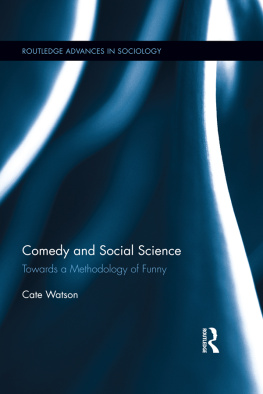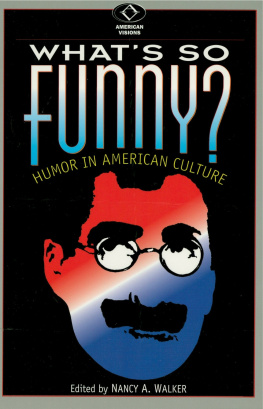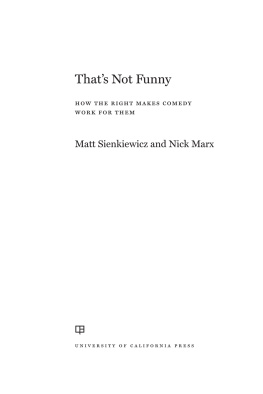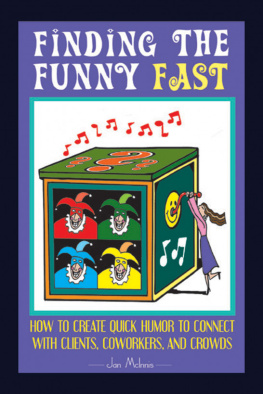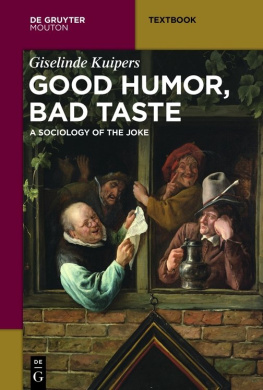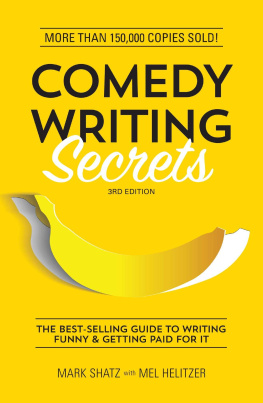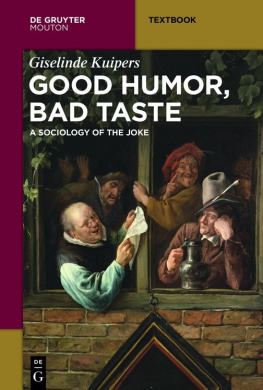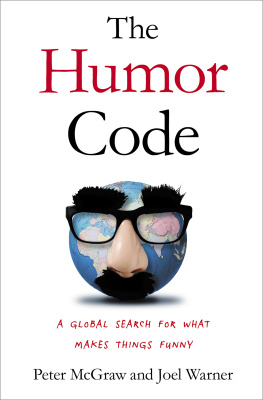The right of Cate Watson to be identified as author of this work has been asserted in accordance with sections 77 and 78 of the Copyright, Designs and Patents Act 1988.
All rights reserved. No part of this book may be reprinted or reproduced or utilised in any form or by any electronic, mechanical, or other means, now known or hereafter invented, including photocopying and recording, or in any information storage or retrieval system, without permission in writing from the publishers.
Watson, Cate.
by Cate Watson.
pages cm. (Routledge advances in sociology)
1. Wit and humorSocial aspects. 2. Comic, The, in literature.
3. Humor in literature. I. Title.
Routledge Advances in Sociology
For a full list of titles in this series, please visit www.routledge.com
123 From Corporate to Social Media
Critical Perspectives on Corporate Social Responsibility in Media and Communication Industries
Marisol Sandoval
124 Vision and Society
Towards a Sociology and Anthropology from Art
John Clammer
125 The Rise of Critical Animal Studies
From the Margins to the Centre
Nik Taylor and Richard Twine
126 Atoms, Bytes and Genes
Public Resistance and Techno-Scientific Responses
Martin W. Bauer
127 Punk Rock and the Politics of Place
Building a Better Tomorrow
Jeffrey S. Debies-Carl
128 Bourdieus Theory of Social Fields
Concepts and Applications
Mathieu Hilgers and Eric Mangez
129 Global Management, Local Resistances
Theoretical Discussion and Empirical Case Studies
Edited by Ulrike Schuerkens
130 Migrant Professionals in the City
Local Encounters, Identities and Inequalities
Edited by Lars Meier
131 From Globalization to World Society
Neo-Institutional and Systems-Theoretical Perspectives
Edited by Boris Holzer, Fatima Kastner and Tobias Werron
132 Political Inequality in an Age of Democracy
Cross-national Perspectives
Joshua Kjerulf Dubrow
133 Social Networks and Music Worlds
Edited by Nick Crossley, Siobhan McAndrew and Paul Widdop
134 Gender Roles in Ireland
Three Decades of Attitude Change
Margret Fine-Davis
135 (Sub) Urban Sexscapes
Geographies and Regulation of the Sex Industry
Edited by Paul Maginn and Christine Steinmetz
136 Advances in Biographical Methods
Creative Applications
Edited by Maggie ONeill, Brian Roberts and Andrew Sparkes
137 Social Cohesion and Immigration in Europe and North America
Mechanisms, Conditions and Causality
Edited by Ruud Koopmans, Bram Lancee and Merlin Schaeffer
138 Digital Publics
Cultural Political Economy, Financialization and Creative Organizational Politics
John Michael Roberts
139 Ideology and the Fight Against Human Trafficking
Reyhan Atas-Topcuolu
140 Rethinking Serial Murder, Spree Killing, and Atrocities
Beyond the Usual Distinctions
Robert Shanafelt and Nathan W. Pino
141 The Re-Use of Urban Ruins
Atmospheric Inquiries of the City
Hanna Katharina Gbel
142 Reproductive Tourism in the United States
Creating Family in the Mother Country
Lauren Jade Martin
143 The Bohemian Ethos
Questioning Work and Making a Scene on the Lower East Side
Judith R. Halasz
144 Critical Theory and Social Media
Between Emancipation and Commodification
Thomas Allmer
145 Socio-Cultural Mobility and Mega-Events
Ethics and Aesthetics in Brazils 2014 World Cup
Rodanthi Tzanelli
146 Seeing Religion
Toward a Visual Sociology of Religion
Edited by Roman Williams
147 European Citizenship and Social Integration in the EU
Jrgen Gerhards and Holger Lengfeld
148 International Migration and Ethnic Relations
Critical Perspectives
Edited by Magnus Dahlstedt and Anders Neergaard
149 Stigma and the Shaping of the Pornography Industry
Georgina Voss
150 Religious Identity and Social Change
Explaining Christian conversion in a Muslim world
David Radford
151 God, Politics, Economy
Social Theory and the Paradoxes of Religion
Blent Diken
152 Lifestyles and Subcultures
History and a New Perspective
Luigi Berzano and Carlo Genova
153 Comedy and Social Science
Towards a Methodology of Funny
Cate Watson
Contents
The following publishers are gratefully acknowledged:
Quotations from The Theory of the Leisure Class by Thorstein Veblen, first published 1899, are taken from the 1994 edition published by Dover Publications, Inc., New York.
John Wiley and Sons have granted permission for the McGonagallesque poem to be reproduced from Ian Stronach, Julie Allan and Brian Morriss (1996) paper: Can the mothers of invention make virtue out of necessity? An optimistic deconstruction of research compromises in contract research and evaluation, British Educational Research Journal , 22(4), 493509.
Michael Mulkays Nobel banquet incident ( The Word and the World , 1988, pp. 242251, George Allen and Unwin, London) appears by kind permission of Taylor and Francis, UK.
Symposium Journals Ltd, Oxford, UK, have granted permission for extensive quotation from: C. Watson, Today, how can we not speak of the university? Towards the next generation, Power and Education 4(3), 342354.
The book is an expanded version of:
Cate Watson, A Sociologist Walks into a Bar (and Other Academic Challenges): Towards a Methodology of Humour, Sociology . Published online before print January 13, 2014, doi: 10.1177/0038038513516694. SAGE Journals (http://online.sagepub.com).
7
Writing for Publication
Introduction
Getting published is a primary concern for the social scientist. While this is a long-established academic practice, it has been given added impetus with todays emphasis on performance management driven by various forms of research assessment. This chapter examines the paratextual practices that surround academic publishing, aiming to raise awareness of the importance of the production of texts in order to inform the writing practices of the humorously inclined academic who aspires to increased impact. The para-text is what announces the text to the world:
Paratexts are those liminal devices and conventions both within and outside the book, that form part of the complex mediation between book, author, publisher and reader: title, forewords, epigraphs, and publishers jacket copy are part of a books private and public history.

